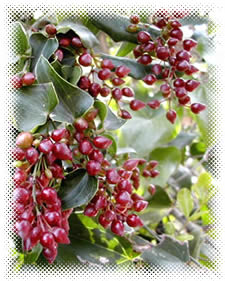|
|
|
|
| Common Names : zarzaparrilla |
| Actions: hormonal stimulator |
| Medicinal Uses:stress reduction, blood purifier |
| Parts Used: Root |
| Constituents: Parillin (Smilacin), glucoside, sarsapic acid, Saponins: sarsasaponin, sarsaparilloside, many flavonioids and starch |
|

The spicy, pleasant smelling sarsaparilla root is what gave old fashioned root beer its bite and is the part used medicinally. For many years, people thought sarsaparilla had testosterone in it, (it doesn't, nor does any other plant),the exact mechanism of action has not been identified. Some herbalists think that that the phytosterols it contains stimulate hormone-like activity in the body.
Certain root phytochemicals, called saponins, help inflammatory conditions by acting as a blood purifier, most likely by disabling bacterial components called endotoxins. (1)While the effects on sarsaparilla on hormones remain controversial, sarsaparilla plays a beneficial role in herbal formulas as a detoxifying and stress reduction herb.
By the time the Spanish conquistadores arrived in Jamaica, they found the indigenous tribes using beverages made with sarsaparilla as a general health tonic. The word Sarsaparilla comes from the Spanish sarza, meaning a bramble, and parilla, a vine, in allusion to the thorny stems of the plant.
|
|
Preparation Methods :Tincture, Capsules, Tea: 2-6 grams of root brewed per day. Sarsaparilla blend well with cinnamon and other spicy roots, and makes a very pleasant drink.
|
|
 Buy Bulk Organic Sarsaparilla Buy Bulk Organic Sarsaparilla
|
| Side Effects: |
|---|
| In people with kidney problems or diabetes, damage to the kidney can result if sarsaparilla is taken is excessive doses. |
| |
- James Duke, The Green Pharmacy Herbal Handbook (2000)
|
|
|
|
|
|